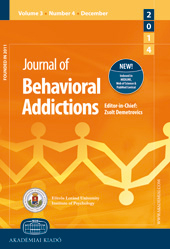Obtaining quality data using behavioral measures of impulsivity in gambling research with Amazon’s Mechanical Turk
Obtaining quality data using behavioral measures of impulsivity in gambling research with Amazon’s Mechanical Turk
Author(s): Magdalen G. Schluter, Hyoun S. Kim, David C. HodginsSubject(s): Behaviorism
Published by: Akadémiai Kiadó
Keywords: behavioral tasks; gambling; impulsivity; crowdsourcing; MTurk
Summary/Abstract: To date, no research has examined the viability of using behavioral tasks typical of cognitive and neuropsychology within addiction populations through online recruitment methods. Therefore, we examined the reliability and validity of three behavioral tasks of impulsivity common in addiction research in a sample of individuals with a current or past history of problem gambling recruited online. Methods. Using a two-stage recruitment process, a final sample of 110 participants with a history of problem or disordered gambling were recruited through MTurk and completed self-report questionnaires of gambling involvement symptomology, a Delay Discounting Task (DDT), Balloon Analogue Risk Task (BART), Cued Go/No-Go Task, and the UPPS-P. Results. Participants demonstrated logically consistent responding on the DDT. The area under the empirical discounting curve (AUC) ranged from 0.02 to 0.88 (M = 0.23). The BART demonstrated good split-third reliability (ρs = 0.67 to 0.78). The tasks generally showed small correlations with each other (ρs = ±0.06 to 0.19) and with UPPS-P subscales (ρs = ±0.01 to 0.20). Discussion and conclusions. The behavioral tasks demonstrated good divergent validity. Correlation magnitudes between behavioral tasks and UPPS-P scales and mean scores on these measures were generally consistent with the existing literature. Behavioral tasks of impulsivity appear to have utility for use with problem and disordered gambling samples collected online, allowing researchers a cost efficient and rapid avenue for conducting behavioral research with gamblers. We conclude with best-practice recommendations for using behavioral tasks using crowdsourcing samples.
Journal: Journal of Behavioral Addictions
- Issue Year: 7/2018
- Issue No: 4
- Page Range: 1122-1131
- Page Count: 10
- Language: English

